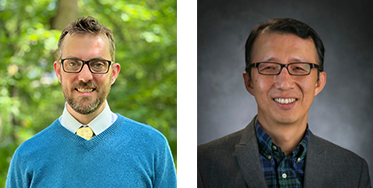New Paper Examines Campus Belonging for Student Military, Veterans in STEMM
Findings provide practical steps university educators can take to promote academic success
March 4, 2023 | By William Koehler and Karen Rivedal, WCER Communications

Ross Benbow and You Geon-Lee are studying how student military and veterans can use social ties to excel in STEMM fields.
Supported by NSF grants totaling close to $2 million since 2019, WCER researchers Ross Benbow and You-Geon Lee have published new research exploring the social support and campus belonging of student military service members and veterans (SSM/Vs) in science, technology, engineering, mathematics and medical (STEMM) fields.
Despite SSM/Vs being one of the fastest-growing groups of nontraditional students in American universities in recent years and their potential to diversify STEMM fields, little prior research has charted the academic development and success of these unique students across university STEMM contexts, Benbow and Lee say.
In an extension of Benbow’s WCER-based VETWAYS project, the findings of the new paper start to fill that knowledge gap using social capital theory to “explore links between STEMM SSM/V social support and a sense of campus belonging…within 4-year campus communities.”
Published in the Journal of College Student Development, the paper notes campus belonging and social support have been shown to be important to achievement among marginalized college students. But few studies have closely explored such relationships among SSM/Vs.
Results offer university educators—including college leaders, academic and career counselors, student affairs professionals, STEMM administrators, and STEMM faculty—useful information for improving SSM/Vs’ feelings of campus belonging and engagement.
While the study primarily represents a first step in a burgeoning research area, its research implications do provide a compelling basis for those involved with SSM/V STEMM students to reach out early and actively offer social support through the following channels:
● SSM/V-focused university and/or department orientation sessions, “which have been shown to foster engagement, social networking, and the sense of entering a veteran-friendly space among SSM/Vs,” the researchers say.
● Intentional social network facilitation by university educators, who can broker ties between SSM/Vs and their academic peers through a variety of formal and informal contexts.
Depending on SSM/V preferences, counselors also can encourage STEMM academic and career plans that take advantage of students’ military skill sets such as adaptability, discipline, and teamwork, taking care to develop connections with local scientific and technical employment representatives and outreach specialists.
Looking ahead, in conjunction with newly launched work involving larger or broader samples, researchers say this study may form the basis for greater inquiry—both independent and comparative—into the improvement of social, academic, and career outcomes for STEMM SSM/V students.


